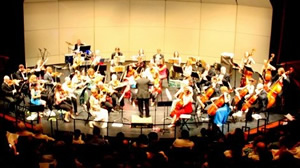An Appalachian Summer Festival was brought into being in 1984 as a chamber music series, and takes place every July on the campus of Appalachian State University in Boone, NC. In the course of 37 years its range has grown greatly. According to its website, this expansive calendar of events is “an annual arts festival presenting and producing programs in music, theatre, dance, film and visual arts.” An Appalachian Summer Festival has become one of the leading arts locales in the state and beyond. “For many years,” it continues on the website, ”The New York Times has included An Appalachian Summer Festival in its ‘Summer Stages’ issue, which profiles the nation’s most prominent and interesting summer arts festivals.” This year the festival calendar – with near-daily presentations and in continuing response to Covid-19 – offered a combination of in-person socially distanced events, along with livestream and virtual performances.
This event was held as part of the 2021 festival to celebrate the Rosen-Schaffel competition. It was a free, livestreamed presentation. The competition, it says on the website, “is known for the pivotal role it has played in launching the careers of some of our state’s most promising young artists.” Two of those artists appeared as part of this celebration. From the quality of their performances, the competition’s reputation is amply merited.
Morgan Short, harp, won 1st prize in the Rosen-Schaffel competition in 2018. Her first piece was several movements from Handel’s Suite in B-flat, HWV 440, which she herself arranged for the harp. Short had an appealing stage presence, with physical flourishes which even gave the performance an element of theatricality. She impressed with a full tone, expressive phrasing and appreciable dynamic range. Perhaps the nicest moment came in the Sarabande, where there was a fine upward sweep, and a lovely shift into the bass.
Her other piece was the trio “Zitti, Zitti” from The Barber of Seville by Gioachino Rossini. Nicolas-Charles Bochsa was the composer/arranger of this fantasy piece based on the Rossini tune (which Rossini himself derived from Haydn). Short displayed impressive virtuosity in this substantial-sized work, with fluent runs around the instrument and especially in the high range. It had an energetic spirit. In the opera, the attempted elopement is about to occur, and there are some funny stage goings-on. Here, even with the substantial skill in the performance, the harp could not effectively re-create the bubbling comedy of a trio for singers and orchestra. One would best appreciate the harpist’s skill for itself, outside the experience of the opera.
The other performer was baritone Andrew René. He sang Mahler’s first song cycle, Lieder eines fahrenden Gesellen. With its narrator a rejected lover wandering the countryside, the text of this intense piece has strong elements suggesting Schubert’s Winterreise, written not quite sixty years before. Here however, in this work of the young Mahler, the setting is likely the springtime. Mahler wrote the text himself; the music, coming from a composer in his mid-twenties, is already a product of compositional maturity.
A feature of this cycle is its shifting moods, expressing the fluctuating inner state of the narrator. René has a full, resonant voice which left the listener wanting to hear more. In the first two songs however, the fluid emotional state of the narrator didn’t reach full expression. The best came in the intense third song, “Ich hab’ ein glühend Messer.” René captured the power of this outburst of despair with full expression. With the exception of a brief respite in the middle, the song is at a consistent emotional level, and that seemed to suit the singer well. In the almost unbearably poignant final song, “Die zwei blauen Augen” – with its deep and unmistakable evocation of the linden tree in Winterreise – René came closest to the flickering mental state of its narrator. The performance ended beautifully in its expression, so characteristic of Mahler, of the sweet and the bitter inescapably intertwined.
The name of the pianist was unfortunately omitted. She played skillfully. A moment which stood out was the slithering ending of the third song, as perhaps the narrator’s mind disintegrates. The ending of the cycle, with its searching shift from major to minor, was beautifully done.
Around these musical presentations, there were spoken segments of thanks, and appreciation to the benefactors of the Rosen-Schaffel competition, Nancy and Neil Schaffel. Previous participants spoke, in two segments, of the value of the competition to their musical careers, and of the spirit of the event in promoting their musical development.
The highlight of the spoken sections was an interview with Nancy and Neil Schaffel. They are the second generation of benefactors to music at Appalachian State. Nancy Schaffel’s parents, Arnold and Muriel Rosen, were among the founders of An Appalachian Summer Festival. They acted out of a lifelong commitment to the fine arts and are memorialized in the name of the competition: Rosen-Schaffel. Nancy and Neil Schaffel are multi-million-dollar benefactors of the competition they created, in the belief of the importance of music in our lives, and the desire to support young musicians in this demanding artistic profession. The touching ending to the interview and the program came when the Schaffel’s were shown their names newly adorning the recital hall at Appalachian State. Many young musicians have benefitted and will benefit from their generosity. We can only be grateful for the contributions of people like the Schaffel’s who, in deep humanistic spirit, act to support the creative and most positive impulses of other people and of society.












